I am sorry to say this, but if you have seen the trailer for writer-director Lisa Joy’s Reminiscence, you have effectively seen the movie. Hugh Jackman intoning voiceovers? Very cool scenery soaked through with floodwaters? Rebecca Ferguson in a slinky dress and Thandiwe Newton looking tired of everyone? You’ve got the gist.
Not every movie is so deftly captured by the snipped-up advertising version of itself. There are, in fact, many trailers that are full of misdirection and delicious vagaries. Not so this one. Would you like a worn amateur detective story dressed up in an excellent near future outfit? Here. I have just the movie for you.
Light spoilers for Reminiscence follow.
The plot of Reminiscence borrows from more things than I can possibly list, but those most relevant to this audience include Strange Days, Blade Runner, and Dark City, with just a dash of seasoning from Inception, Minority Report, and Into the Badlands. In an unspecified moment in the future, Miami is underwater. Temperatures are so high that people have become nocturnal to escape the sun, though oddly no one is as pale as this might suggest. (Perhaps they wake in the afternoon and go outside for a dose of vitamin D.)

Climate change is only one of the struggles facing this future, where an unspecified war rages on an unnamed border and, closer to home, the rich continue to do as the rich do, which in this case means hoard dry land (there are “land barons”) and wall off their homes from the risen waves. Nick Bannister (Hugh Jackman) explains some of this in a monotonous voiceover that is the movie’s biggest weakness. Yes, it’s a trope: the hard-bitten detective (which Nick is not, professionally speaking) narrating the case he needs to crack. But dialogue is not writer-director Lisa Joy’s strong suit. She’s often good at making a line do double-duty—a necessary detail blended with a gruff bit of character. But when this doesn’t work, characters speak in clichés or bits of stiff exposition.
“The past can haunt a man,” Nick’s voiceover begins. “That’s what they say. The past is just a series of moments. Each one perfect. Complete. A bead on the necklace of time.”
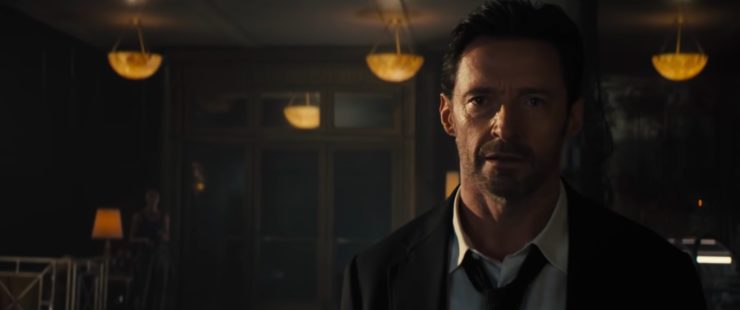
This introduction to Reminiscence’s concepts is so corny and distracting that it threatens to send me off on a tangent already—Past moments aren’t perfect! What does this have to do with haunting!—but first I need to finish a thought, which is this: The world of this film is fascinating, even when I want it to make more sense. Trains run lightly along the top of the water, as if floating. One woman lives in a clapboard house out to sea that you know, as soon as you see it, will come up again. Graffiti indicates some of the fury the have-nots have for the haves, represented here by one Very Bad Rich White Man whose name is Sylvan, as in woods. In a drowned city, trees are rare.
Buy the Book
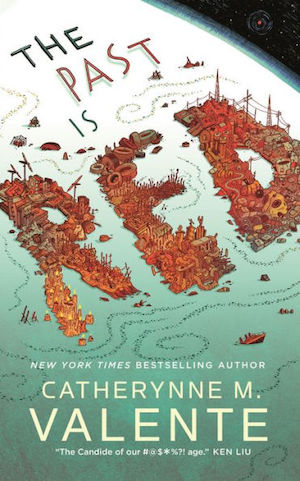

The Past Is Red
Ordinary people have rebuilt the world as best they can, complete with little boats to take themselves to nightclubs and floating markets; Nick wears nifty boots to keep his feet dry on his walk to work. Small solar arrays sit atop houses, soaking up power while the residents sleep. Because they are only awake for a few daylight hours, the light is always golden. Joy, who created Westworld with her husband, Jonathan Nolan, knows how to work with reflection, with all those towering skyscrapers and the water slinking up around their heels. It looks amazing.
But the people in Joy’s story seem strangely separate from their world. Rage simmers underneath the city, Nick tells us. People are pissed, and rightly so.
Not Nick, though. Not Nick, not his clients, not anyone who actually factors in this story. The disconnect between narrative and world is disconcerting, and emphasizes the way Reminiscence’s two aspects—vintage noir mystery and near-future science fiction—barely seem to touch fingertips, let alone hold hands.
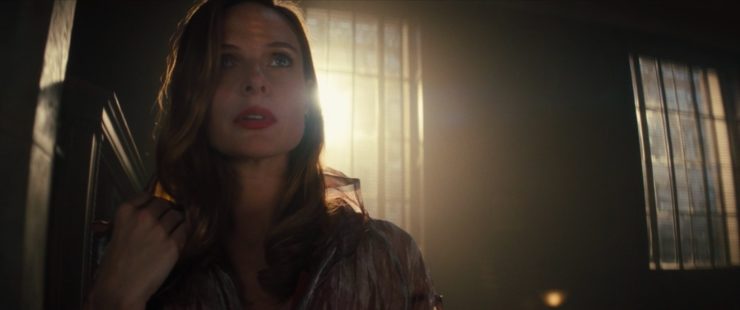
The place where these elements meet is in the character of Mae, played gamely by a somewhat miscast Rebecca Ferguson. She slinks into Nick’s life one night, all shiny dress and sultry gaze, asking if he can help her find her keys. This is no search through a parking lot, though. Nick’s job is running a complex machine that lets people revisit their memories. So, to be fair, he does have a job finding things—just in people’s minds.
Conveniently, Nick, his partner/former war buddy Watts (Thandiwe Newton), and the audience get to watch, too, as each client’s memories play out on a sea of holographic strands. Part of this troubled future, Nick explains, is that because life is so shit, everyone wants to return to the happier moments of their past. Some come to revisit a tryst with a lover, or an afternoon with a beloved dog. Some get trapped in a memory they can’t stop revisiting. Nostalgia is dangerous.
Mae is the most obvious femme fatale who could possibly walk into Nick’s tomb-like marble-lined office. But all Nick sees is temptation, no matter how much Watts rolls her eyes. (The name Watts is not, so far as I can tell, a reference to Mary Stuart Masterson’s character in Some Kind of Wonderful, alas.) Before long, Nick and Mae are involved. Before much longer, she vanishes, and the search for her leads an inexplicably obsessed Nick into an underworld of drugrunners, nasty henchmen, entitled rich guys, and tragedy. A desperation bred of inequity hovers in the corners of Nick’s quest, but there is little sympathy for the desperate and struggling, unless those qualities happen to manifest in a beautiful love interest.
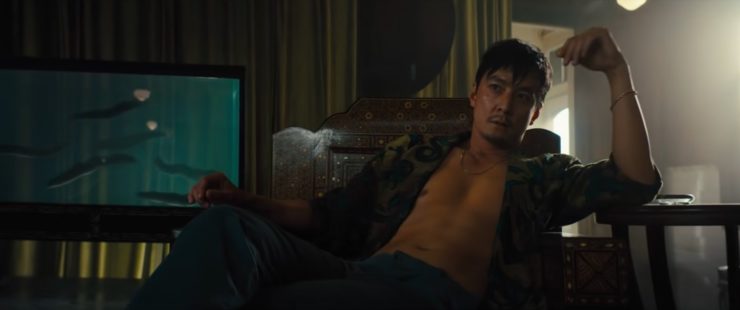
One of the problems with this plot is that in order to believe that a man would throw away his life in search of his lost love, you have to believe in that love. This love is a relationship of some months which involves two very attractive people who have gotten together because the plot demands it. I know: This is how plots work. But we need chemistry, we need spark, we need a level of believability that simply does not exist here. When Mae and Nick first hook up, a very symbolic water glass overflows on a nearby counter, and I regret to report that I tried to groan and laugh at once. It was awkward.
Jackman is oddly distant in this film, and Ferguson has the most complex role to play, a character who is hiding different things at different times but must eventually reveal an honest emotional side. She gets the movie’s best trick—a speech delivered through the medium of memory, which is the only time the film is all that interested in how accessible memories might be creatively used—and for a moment, there’s a flash of what she’s capable of. But only Newton can really get past the basics of her character’s archetypal building blocks and turn Watts into a person.
But about those memories. The basic conceit of Nick’s tank—which he learned to use in the Navy, where it was an interrogation device—is that people can be led into play-by-play visions of moments from their past, like extremely thorough mental home movies. If this is how your memory works, I’m jealous. Memory is a strange thing, less a recording than a shuffling of photos, flashes from here and there, stories told and retold and reshaped every time we remember them. Joy talks about the fallibility of memory in interviews for this film (her conversation with Charlie Jane Anders is arguably more interesting than the movie), but within the film, memories are, like Nick says, complete moments. They are not the complex and messy flashes of image and feeling that exist in our heads.
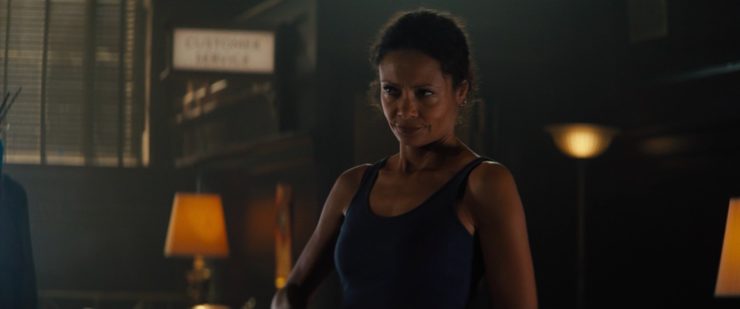
The way the elements of Reminiscence don’t quite add up can lead a person to tip their head sideways and start to wonder if this whole world is just another future-past theme park, a Miamiworld, somewhere in the same realm as Westworld. Why does Mae sing standards from our past when her story is set in our future? Why, apart from the obvious need to trigger our nostalgia, is everyone dressed like they’re from the past? What’s happening in the rest of the world, farther than New Orleans? The movie constantly steps up to some fascinating practicality of the waterlogged world and then scoots away again, leaving me wanting to know things that I absolutely do not need to know, like where they import the whiskey from, who grows the food, what other cities are flooded, and what “border” is playing host to yet another war. I’m supposed to be invested in Nick’s search for Mae, not in the minor details of Joy’s fabricated world. But the latter was just far more intriguing.
If I sound frustrated, it’s not just because Reminiscence looked so glossy-cool. The idea that we’ll seek out better times when the future crumbles around us is, well, likely. We won’t have Jackman’s tank, but what will we have? Will we try to recreate a world we’ve lost? Will we just spend more and more time online as the coasts recede around us? During the pandemic, people listened to nostalgic playlists, comfort-watched familiar TV, and reread old books, all of which certainly backs up Joy’s idea that we’ll seek out comfort in the past. But what does that mean for the present, and for the future we are facing, where the oceans rise and places become unbearably hot? In the end, Joy doesn’t ask questions of her premise. She just uses it to fuel a story that, in its own way, also seeks resolution and comfort in the past—in familiar elements of oft-told stories. The trappings are new, but the heart is the same.
Molly Templeton lives and writes in Oregon, and spends as much time as possible in the woods.










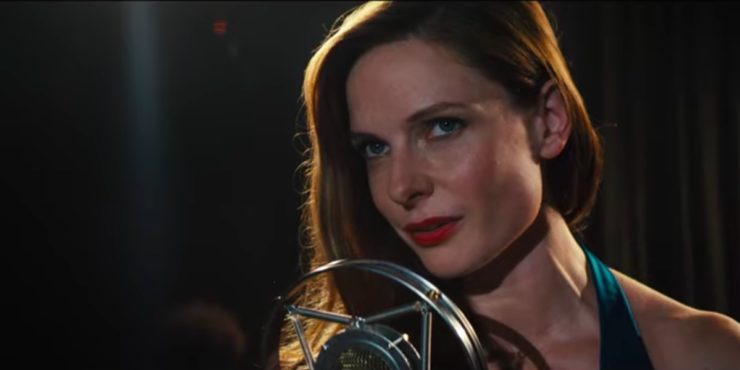
I believe it was here in the comment section of the trailer for the movie that someone said, “It’s a thriller so Wolverine gets beaten up a lot.” That movie sounds much more interesting than what’s on the screen.
Next time, use hypnosis to find your keys. It’s cheaper and less likely to get you killed.
This review perfectly encapsulates my feelings after watching the film last night. I can’t remember the last time I was this utterly frustrated watching a movie.
My brain kept fighting with itself, telling me this should be a really good watch, knowing all the people involved, but I wasn’t buying it. In the end, I didn’t feel like I “wanted my 2 hours back”, but I sure won’t give this feature a second thought.
Yes, the worldbuilding is wasted on this story. It may as well be Miamiworld. The plot is completely familiar, even mundane. It reminds me of questions about season 2 of Westworld: would that season have been interesting at all if not filtered through someone’s shattered memory. The linear story there didn’t add up to much. Same with this film.
At this point, memory games used to structure a plot are just shtick that ties back through the Nolans to Memento. It’s not original anymore, especially if it covers up a predictable story.
Last detail: without spoiling the ending, the time jump almost made me snort. It wasn’t romantic in the least (unless that’s the point). And if they are already having trouble paying their bills, who’s going to pay to keep the tank running for decades? But then the very lightly sketched economics of this world aren’t important anyway.
Wow, this review pretty much exactly captures my reaction to this movie too. Nicely done, Templeton!
Thank you. Now I can avoid it.